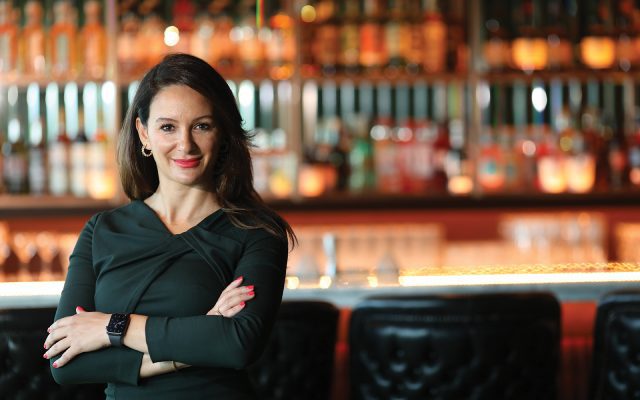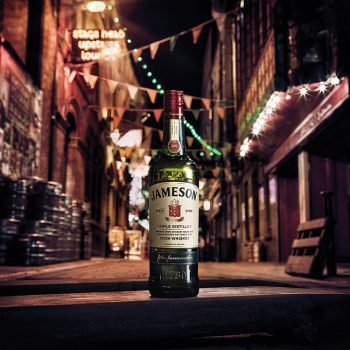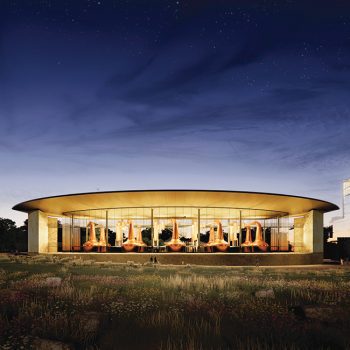The big interview: Nodjame Fouad, Irish Distillers
Double-digit sales success, multi-million-euro investments, and myriad new product launches, Nodjame Fouad has had a remarkable first year as CEO of Irish Distillers.

*This feature was originally published in the November 2023 issue of The Spirits Business magazine.
Having met, spoken to and interviewed countless drinks industry professionals in my time, it still surprises me how many stumbled upon their spirits-focused careers by accident – yet have become entirely enthralled by the industry. But for Nodjame Fouad, chairman and CEO of Irish Distillers, the Irish whiskey arm of Pernod Ricard, her move into the sector was far more deliberate.
“I started my career in advertising, but I moved into spirits because I wanted to work on Absolut vodka’s iconic Absolut bottle campaign,” Fouad explains. “For me, Absolut is an exceptional example of a brand entering into a culture and becoming globally iconic and locally relevant.”
The transition from advertising to spirits came in 2008 when Fouad was appointed marketing director, Americas for Absolut. “It was a pivotal career moment for me to be part of this incredible brand’s team. In the subsequent years, I held several key roles at regional and global levels at Absolut, further developing my experience in the drinks industry.” From there, Fouad moved to global travel retail as vice-president marketing within Pernod Ricard Global Travel Retail, most recently as president and CEO of Pernod Ricard Japan. That was until 1 July 2022 when Fouad took over the helm of Irish Distillers from Conor McQuaid.

Now just over a year into being chairman and CEO of Irish Distillers, Fouad has overseen some significant achievements at the company. In the year ending 30 June 2023, Irish Distillers reported 11% net sales growth across its portfolio – largely driven by Jameson. The world’s biggest-selling Irish whiskey brand, and the top-three-selling international whisky brand (IWSR Drinks Market Analysis), experienced a 10% rise in global net sales, with what Fouad describes as “dynamic growth” in key markets such as the UK, South Africa, global travel retail, and Ireland. In Asia, the brand enjoyed 56% growth, “albeit off a much smaller base”, she notes.
“We understand we have an incredible product in Jameson and the success of the brand is absolutely due to the taste and the quality of the product, as well as the consistent and determined brand building over 30 years, which has helped cement its position as a truly global brand. For context, in 1996 we sold one million cases of Jameson. By 2010, we reached three million cases, and in 2022 we surpassed the 10-million-case mark,” Fouad highlights.
Laser-focused
Fouad believes Jameson’s taste and brand profile are what makes it appeal so strongly to a wide consumer audience, “helping it to transcend geographies”. “And while our strategy has ben laser-focused on growing Jameson globally, its success has supported the growth of the Irish whiskey category more broadly as is evidenced by the growth of our entire portfolio of Irish whiskeys, four of which are in the top 10 Irish whiskey brands,” Fouad adds.
Consumers are leaning into higher-end Irish whiskeys too, as evidenced by the performance of Irish Distillers’ Prestige range during the company’s 2023 financial year. This segment, which comprises Redbreast, Midleton Very Rare, the Spot whiskeys, Method and Madness, and Knappogue Castle, delivered a net sales growth of 22%. “The diversity of the portfolio ensures that there is something for every Irish whiskey consumer – new or existing,” Fouad adds.
“With a reputation built on the whiskey of choice for those ‘in the know’, Redbreast has anchor expressions in the super-premium space that are accessible to a wide consumer audience, as well as innovations that create a discovery opportunity for our target consumer market such as our recent Tawny Port Cask Edition launch as part of the Redbreast Iberian Series.”
She also says Midleton Very Rare is “considered the pinnacle of luxury Irish whiskey”, adding: “This is evidenced through our ultra-high-end releases, such as Silent Distillery Collection, a range of 45-50-year-old releases.”
However, with the cost-of-living crisis squeezing incomes across the word, will demand for high-end, super-premium-plus whiskeys continue?
“I think that we can all acknowledge that consumer spending habits have undergone some changes over the past number of years,” Fouad says. “But what we are finding, and what is clear from market trends, is that globally, people may be drinking less, but buying better.
“We’re seeing this reflected in the Irish whiskey category, where super-premium-plus brands now represent 20% of market share and figures from Discus [Distilled Spirits Council of the US] show that more and more consumers are turning to Irish whiskey as their luxury whiskey of choice in the US. Irish whiskey is going to be an increasingly important player at the higher end of the whiskey market, and we can see that there is an appetite for our brands, which is why I am excited about the global growth opportunity for our prestige portfolio.”
Opportunities for Irish whiskey lies in “untapped markets”, such as Japan, China and other parts of Asia, which “represent great potential”. “While demand for our exceptional whiskeys has come historically from traditional Irish whiskey markets in the US and Europe, year on year there has been an increase in sales to Asian whiskey consumers seeking to expand their collections with whiskeys,” Fouad adds.
Sustainable success
Success to Irish Distillers means more than sales, however, Fouad notes. As a leader of the Irish whiskey category, Irish Distillers is a custodian of the future in more ways than one; the company takes its responsibility to create enough whiskey for future generations extremely seriously, but also the need to ensure production methods are as sustainable as possible. By 2026, Irish Distillers hopes Midleton Distillery will be carbon neutral.
“In 2020, we launched our hugely successful sustainability programme for barley growers to support the long-term viability of the spring barley sector in Ireland by incentivising farmers to deliver further environmental and biodiversity initiatives on their farms,” Fouad says. “In 2022, 284 spring barley farmers participated in the programme. And in 2023, we joined forces with Heineken in a three-year partnership to support malting barley farmers in adopting regenerative agricultural practices on their farms.”
There is still plenty more to be done though, as Fouad explains. By the end of 2025, all Irish Distillers secondary packaging will be recyclable, reusable, compostable or removed. Jameson will pave the way with the “progressive removal” of gift boxes, eradicating approximately four million units between now and the end of 2025.
The planned €250 million (US$248.8m) second Midleton Distillery will also be built sustainably from the ground up. Plans for the new facility were revealed in September 2022. The new distillery will be located on a 55-acre site adjacent to the company’s Midleton Distillery, allowing Irish distillers to increase production of pot still and grain whiskey.
“The plans are progressing well,” notes Fouad. “We are currently progressing through the planning process. Once operational, the new distillery will also be a carbon-neutral operation for scope one and two emissions. Our aim is to phase out the use of fossil fuels on our production sites by reducing energy use and recycling waste heat in the distillation process to power the distillery.
“It is expected to be operational in 2026 and will be a true whiskey operation of the future, leading the way in sustainability in Irish whiskey production.”

The original Midleton site will also become carbon neutral; prior to announcing the new distillery, Irish Distillers invested €50m into reaching this goal by 2026. “We understand that as a business, operating and thinking sustainably is not an option, it’s a necessity,” Fouad adds. “And that is why sustainability is at the core of everything that we do at Irish Distillers. We minimise waste at every step by reimagining, producing and distributing our products in ways that optimise and help preserve natural resources.”
The Midleton Distillery Experience in Cork, home to Irish whiskey brands including Jameson, Powers, Redbreast, Midleton Very Rare, Spot, and Method and Madness, was recently opened following a €13m renovation. Fouad describes the space as a “world-class, multi-sensory” experience, with the capacity to welcome more than 200,000 guests from around the world every year.
“The upgraded tourist attraction features new and immersive whiskey tours, tastings and experiences, incorporating all seven of Irish Distillers’ whiskey brands as well as an immersive auditorium, modern retail facilities, whiskey tasting and cocktail-making rooms, and a beautiful new café,” Fouad says.
Speaking to Fouad, it’s evident how important the visitor attraction is to the company’s global strategy. “Midleton Distillery is the heart and soul of Irish whiskey, and our new Midleton Distillery Experience will further build on its reputation for excellence on the international stage and cement its position as one of the top tourism attractions in the world,” Fouad insists.
Midleton floods
In October, however, the Midleton Distillery Experience suffered flood damage after storm Babet brought a month’s worth of rain in 24 hours to Midleton town. When the Owenacurra River burst its banks, the main road in Midleton was covered by water, three feet deep. The visitor centre was one of the affected properties and the damage means the space is temporarily closed.
But the Jameson Distillery Bow Street in Dublin remains hugely attractive to tourists, nevertheless. Redeveloped in 2017, the site has been named the ‘World’s Leading Distillery Tour’ at the ‘World Travel Awards’ for five consecutive years. “The role of whiskey destinations cannot be underestimated; they build advocacy and have a significant impact on brand sentiment and purchasing behaviour. We are committed to creating the best whiskey destinations in the world,” Fouad says.
As Fouad is well into her second year as CEO, her ambitions for Irish Distillers are only growing. I ask her where she would like to see the company in another 12 months’ time.
“We have a number of core business priorities, projects and initiatives in progress at any one time,” Fouad replies. “We are committed to continuously moving these forwards to reach our objectives, some of which are more long term in nature. Looking to the next 12 months, and I have touched on some of these over the course of this interview, we will continue to roll out our roadmap to make our distilling operations carbon neutral, progress plans for our new distillery, support the ongoing globalisation of our brands and build out our portfolio, while furthering our sustainability agenda and continuing to focus on our diversity and inclusion initiatives.”
Related news
Cocktail stories: Speed Bump, Byrdi
